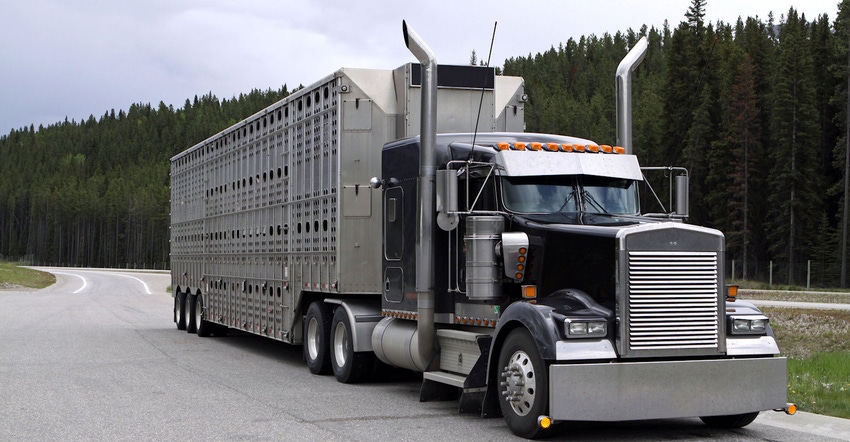Groups seek action on requirements for livestock haulers that account for realities of livestock industry.

Livestock haulers are responsible for the daily transportation of millions of animals, but new rules could limit drivers’ ability to keep animals healthy. The livestock industry is seeking further federal assurances from the government that new U.S. Department of Transportation (DOT) regulations will not negatively affect animal well-being.
Major farm groups asked Transportation Secretary Elaine Chao for a waiver and exemption for livestock haulers from the Electronic Logging Device (ELD) rule and for additional action on DOT’s Hours of Service rule. The groups included the National Pork Producers Council (NPPC), National Cattlemen’s Beef Assn. (NCBA), North American Meat Institute, American Farm Bureau Federation, United States Cattlemen's Assn., and Livestock Marketing Assn.
Unless Congress or the administration acts, carriers and drivers who are subject to the Federal Motor Carrier Safety Administration’s ELD rule must install and use ELDs by Dec. 18. While most farmers and ranchers should be exempt because they can claim covered farm vehicle status, drivers who haul livestock, live fish and insects are likely to fall under the requirements.
In their petition, the groups pointed out livestock haulers’ strong commitment to ensuring the safety of both the animals they’re transporting and the drivers they share the road with. In addition, livestock haulers often receive specialized training beyond that required for their counterparts driving conventional commercial motor vehicles.
“The ELD rule presents some serious challenges for livestock haulers and the animals in their care,” said NPPC president Ken Maschhoff, a pork producer from Carlyle, Ill. “We’re asking the secretary to exempt truckers transporting hogs, cattle and other livestock from this regulation because they have a moral obligation to care for the animals they’re hauling, regardless of what some bureaucratic rule says.”
The Commercial Motor Vehicle Safety Enhancement Act, enacted as part of the 2012 Moving Ahead for Progress in the 21st Century Act, mandated ELDs by Dec. 18, 2017, for commercial motor vehicles involved in interstate commerce when operated by drivers who are required to keep records of duty status. ELDs, which can cost $200-1,000, record driving time, engine hours, vehicle movement and speed, miles driven and location information.
Allison Cooke, NCBA executive director of government affairs, explained that the ELD rule moves the trucking industry towards the use of electronic logging and away from paper logs.
The waiver noted that the current ELD retail marketplace does not clearly support the needs of livestock haulers, and questions remain as to whether current ELDs can accommodate hours of service exemptions currently utilized by the livestock industry.
The waiver explained that concerns over the ELD mandate have exposed incompatibilities between the Hours of Service rule and the livestock industry and are "causing disruption for livestock haulers, increasing already severe driver shortages and endangering the health and welfare of millions of animals transported by livestock carriers daily.”
DOT did recently issue an interpretation intended to address shortcomings in its Hours of Service rule, exempting from the regulations and from any distance-logging requirements truckers hauling livestock within a 150 air-mile radius of the location at which animals were loaded.
The waiver noted, though, that the department's interpretation of the 150-air mile exemption for agricultural commodities is a positive development doesn’t fully address the struggles livestock haulers are facing.
“For instance, in many states, the harvest season is limited to only a few months a year, despite the fact that livestock are harvested all year long,” the letter to Chao noted. “This gap in effectiveness must be corrected in order for livestock haulers to begin relying on the exemption.”
The Hours of Service regulations limit truckers to 11 hours of driving daily after 10 consecutive hours off duty, and their on-duty time is restricted to 14 consecutive hours, which includes non-driving time.
The waiver said one potential solution to explore is allowing haulers to use the entire 14 hours of on-time duty for livestock transportation, especially when traveling in warmer weather.
Cooke said the livestock industry continues to have conversations with the FMSCA regarding its understanding of current exemptions in place. “We’re concerned there’s not enough educating done for local law enforcement at the state level,” Cooke said. “We have ag exemptions in place, and we need to make sure if you are going to use those ag exemptions as you are supposed to, that local law enforcement knows they exist so that they’re not finding our drivers non-compliant.”
Livestock groups are supporting language included in the transportation fiscal 2018 funding bill that would delay the ELD mandate for one year for livestock haulers. Rep. Brian Babin (R., Texas) also has introduced H.R. 3282, which would delay implementation of the ELD mandate for two years.
About the Author(s)
You May Also Like




.png?width=300&auto=webp&quality=80&disable=upscale)
